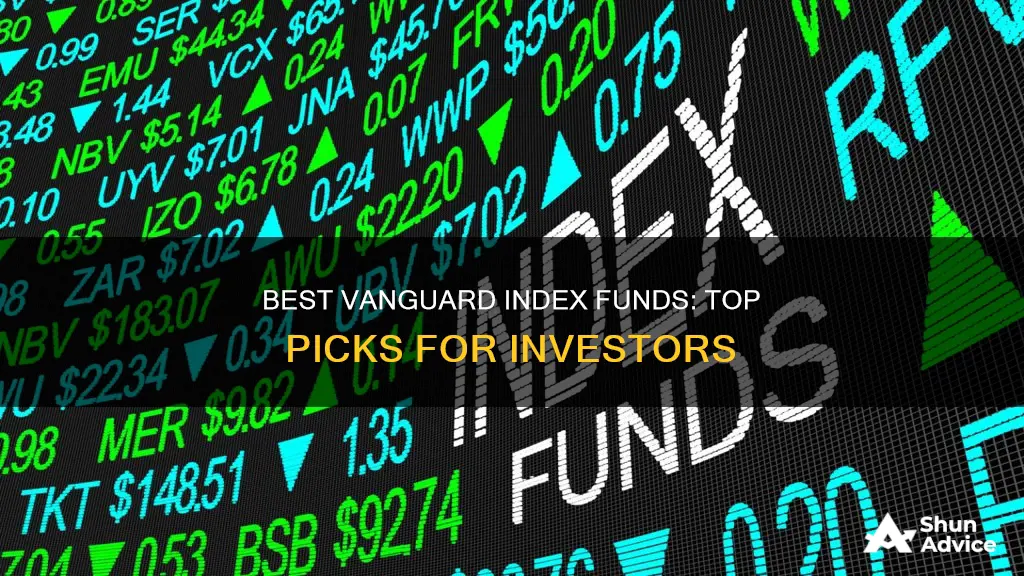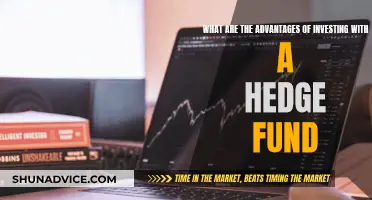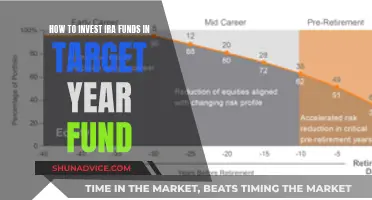
Vanguard is a popular choice for investors looking to invest in index funds. Vanguard's index funds are known for their low fees and broad diversification, making them a good option for beginner investors. The company offers a wide range of index funds and exchange-traded funds (ETFs) that track various market indices, such as the S&P 500 or Nasdaq. Vanguard's funds provide investors with exposure to a diverse range of stocks, bonds, and other securities, helping to minimize risk and maximize returns. With a long history of strong performance and low expense ratios, Vanguard's index funds are worth considering for those looking to invest for the long term.
What You'll Learn

Vanguard's low fees
Vanguard is known for its low fees, which are made possible by its unique ownership structure. The company is not distracted by the demands of private owners or other outside interests. Instead, its funds own the company, and investors own the funds. As more investors choose Vanguard's index funds, the company benefits from new economies of scale, allowing it to lower costs and pass those savings directly to investors.
Vanguard's average mutual fund and ETF (exchange-traded fund) expense ratio is 82% less than the industry average. As of December 31, 2023, Vanguard's average expense ratio was 0.08%, while the industry average was 0.44%.
Vanguard also offers \$0 trading commissions when you buy and sell Vanguard mutual funds and ETFs online. There are no account service fees for brokerage clients who sign up to receive statements and other documents electronically or who hold more than $5 million in Vanguard Qualifying Assets.
Additionally, Vanguard funds never charge front-end or back-end loads. Front-end loads are sales fees charged when you buy fund shares, which can be as high as 8.5% of your purchase amount. Back-end loads, also known as contingent deferred sales charges, are sales fees charged when you redeem or sell fund shares.
Vanguard also offers a range of low-cost Admiral Shares for its index mutual funds, with a minimum investment requirement of $3,000.
When it comes to investing in index funds, many people choose Vanguard due to its low fees and strong performance.
Borrowed Funds: Smart Real Estate Investment Strategy?
You may want to see also

Broad diversification
Vanguard is a great option for investors looking for broad diversification. Diversification is a risk-reduction strategy that involves spreading investments across a variety of assets, sectors, and geographies. Vanguard offers a wide range of index funds and exchange-traded funds (ETFs) that provide exposure to different markets and asset classes, helping investors diversify their portfolios.
Vanguard's index funds and ETFs are designed to track the performance of specific market indices, such as the S&P 500 or Nasdaq. By investing in these funds, individuals can gain access to a diverse range of stocks or bonds within a single fund. For example, the Vanguard Total Stock Market Index Fund Admiral Shares (VTSAX) provides exposure to large-, mid-, and small-cap growth and value stocks across the entire US equity market. Similarly, the Vanguard Total International Stock Index Fund (VTIAX) offers investors access to stock indexes in both developed and emerging markets globally.
Additionally, Vanguard offers bond index funds that mirror the bond markets, investing in government and corporate debt. These funds are considered safer investments but typically yield smaller returns. The Vanguard Total Bond Market Index Fund (VBTLX) is one such example, investing in US investment-grade bonds.
Vanguard also provides investors with the opportunity to diversify their portfolios by investing in specific sectors or asset classes. For instance, the Vanguard Dividend Appreciation ETF (VIG) focuses on blue-chip stocks with a strong history of dividend growth, while the Vanguard Small-Cap Index Fund Admiral Shares (VSMAX) targets smaller publicly held companies.
To further enhance diversification, investors can combine multiple Vanguard funds in their portfolios. For instance, the "three-fund portfolio" is a classic strategy that involves investing in a combination of stock and bond funds, such as the Vanguard Total Stock Market ETF (VTI), the Vanguard Total International Stock ETF (VXUS), and the Vanguard Total Bond Market ETF (BND).
Vanguard's funds offer investors a simple and cost-effective way to achieve broad diversification, helping to reduce risk and improve long-term returns.
Offshore Investment Fund Setup: A Comprehensive Guide
You may want to see also

Vanguard's mutual fund and exchange-traded fund (ETF) options
Vanguard's mutual fund and ETF lineup currently spans 352 options, with funds catering to different investor needs and goals. Beginner investors should focus on funds with low fees and broad diversification to minimise risk over the years.
Mutual Funds:
- Vanguard 500 Index Fund Admiral Shares (VFIAX): Tracks the S&P 500, charges a low 0.04% expense ratio, and requires a $3,000 minimum investment.
- Vanguard Total Stock Market Index Fund Admiral Shares (VTSAX): Provides broad exposure to large-, mid-, and small-cap U.S. companies, with a $3,000 minimum investment.
- Vanguard Growth Index Fund Admiral Shares (VIGAX): Focuses on stocks in large U.S. companies with higher growth potential in sectors like technology and financial services.
- Vanguard Small-Cap Index Fund Admiral Shares (VSMAX): Targets smaller publicly held companies for investors looking to diversify away from larger public companies.
- Vanguard Balanced Index Fund Admiral Shares (VBIAX): Mixes investments between stocks (60%) and bonds (40%) to balance growth and stability.
Exchange-Traded Funds (ETFs):
- Vanguard Total Stock Market ETF (VTI): Tracks the CRSP US Total Market Index, holds 3,674 stocks, and charges a 0.03% expense ratio, with a low minimum investment of around $270.
- Vanguard Total International Stock ETF (VXUS): Provides exposure to international stocks, tracking the FTSE Global All Cap ex US Index, which includes over 8,500 large-, mid-, and small-cap stocks from developed and emerging markets. It charges a 0.08% expense ratio and can be purchased for around $61 per share.
- Vanguard Total Bond Market ETF (BND): Tracks the Bloomberg U.S. Aggregate Float Adjusted Index, a benchmark of investment-grade corporate bonds and U.S. Treasury bonds. It has a low 0.03% expense ratio and pays a 4.5% 30-day SEC yield.
- Vanguard Dividend Appreciation ETF (VIG): Focuses on blue-chip stocks with at least 10 years of dividend growth, excluding the highest-yielding quartile, providing a quality tilt at a low 0.06% expense ratio.
- Vanguard LifeStrategy Growth Fund (VASGX): Offers a diversified portfolio of 80% global stocks and 20% global bonds, rebalanced periodically, with a 0.14% expense ratio and a $3,000 minimum investment.
These funds offer a range of investment strategies, from broad market exposure to specific sectors or asset classes, allowing investors to construct portfolios that align with their personal investment goals and risk tolerance.
Vanguard Total Bond Fund: A Smart Investment Move?
You may want to see also

Vanguard's index funds vs. actively managed funds
When it comes to investing, there are two main types of funds to choose from: index funds and actively managed funds. Both have their own advantages and disadvantages, and the best option for an individual will depend on their financial goals and risk tolerance. Here's a detailed comparison between Vanguard's index funds and actively managed funds:
Vanguard Index Funds:
Vanguard index funds are designed to mirror the performance of a specific market index, such as the S&P 500 or Nasdaq. They aim to keep pace with market returns by investing in a diverse range of stocks or bonds from the index. This passive investment strategy doesn't involve active management, resulting in lower fees for investors. Vanguard's average expense ratio for index funds is 72% less than the industry average, making them an attractive option for cost-conscious investors.
Index funds offer broad diversification, which helps minimize risk. Each fund contains a preselected collection of hundreds or thousands of stocks or bonds. If one investment performs poorly, there's a good chance that another will perform well, reducing potential losses. Additionally, index funds have lower tax implications since they don't change their holdings as frequently as actively managed funds, resulting in fewer taxable capital gains distributions.
Vanguard offers a wide range of index funds, including those that track the total stock market, specific sectors, or international markets. Some popular Vanguard index funds include the Vanguard 500 Index Fund Admiral Shares, Vanguard Total Stock Market Index Fund Admiral Shares, and Vanguard Total International Stock Index Fund Admiral Shares.
Vanguard Actively Managed Funds:
Actively managed funds, on the other hand, aim to beat the market returns. Professional money managers hand-pick investments for these funds, utilizing their expertise and research to make investment decisions. While actively managed funds have the potential to outperform the market, they also come with higher fees due to the cost of managing the fund. The average ongoing management expense for an actively managed fund is 1% more than that of an index fund.
Actively managed funds introduce the risk of the portfolio manager underperforming the benchmark. Additionally, these funds tend to have more taxable capital gains because the portfolio manager trades more frequently. However, they can be more tax-efficient when held in IRAs.
Vanguard offers actively managed funds for investors seeking this option. The choice between index funds and actively managed funds ultimately depends on the investor's risk tolerance and financial objectives. Those seeking higher potential returns and willing to take on more risk may prefer actively managed funds, while those seeking a more passive approach with lower fees may opt for index funds.
In summary, Vanguard's index funds offer a passive investment strategy with lower fees and broad diversification. On the other hand, actively managed funds aim to beat the market returns through active management but come with higher fees and the risk of underperformance. The decision between the two depends on the investor's financial goals, risk tolerance, and investment horizon.
Gold Rush: Largest Investments in the Precious Metal
You may want to see also

Vanguard's equity index products
When investing in Vanguard's equity index products, it is important to consider your investment goals, time frame, and risk tolerance. Their products offer instant diversification, helping to reduce the risk associated with individual stocks or bonds. Vanguard's equity index funds have a low expense ratio, ranging from 0.04% to 0.62%, which minimizes the constant drag on performance.
Some popular Vanguard equity index funds include:
- Vanguard 500 Index Fund Admiral Shares (VFIAX)
- Vanguard Total Stock Market ETF (VTI)
- Vanguard Total International Stock ETF (VXUS)
- Vanguard Total Bond Market ETF (BND)
- Vanguard Dividend Appreciation ETF (VIG)
- Vanguard LifeStrategy Growth Fund (VASGX)
- Vanguard Target Retirement 2070 Fund (VSVNX)
To purchase shares in these funds, investors can follow the steps outlined on Vanguard's website, including logging in, selecting the desired fund, entering the investment amount, choosing a funding method, and reviewing and submitting the transaction.
A Guide to US Mutual Fund Investment Strategies
You may want to see also
Frequently asked questions
Vanguard index funds track the performance of a single market index, such as the S&P 500 or Nasdaq, to mirror its total market returns.
Vanguard creates index funds by buying securities that represent companies across an entire stock index or that are targeted to specific groups, such as an industry sector or similarly-sized companies. Individual investors then purchase shares of the fund, claiming a slice of its returns.
Vanguard 500 Index Fund Admiral Shares, Vanguard Total Stock Market Index Fund Admiral Shares, Vanguard Growth Index Fund Admiral Shares, Vanguard Small-Cap Index Fund Admiral Shares, Vanguard Total Bond Market Index Fund Admiral Shares, Vanguard Balanced Index Fund Admiral Shares, and Vanguard Total International Stock Index Fund Admiral Shares.
Investors make an initial minimum investment, typically around $3,000, and pay annual costs to maintain the fund, known as an expense ratio, based on a small percentage of the cash invested in the fund.







